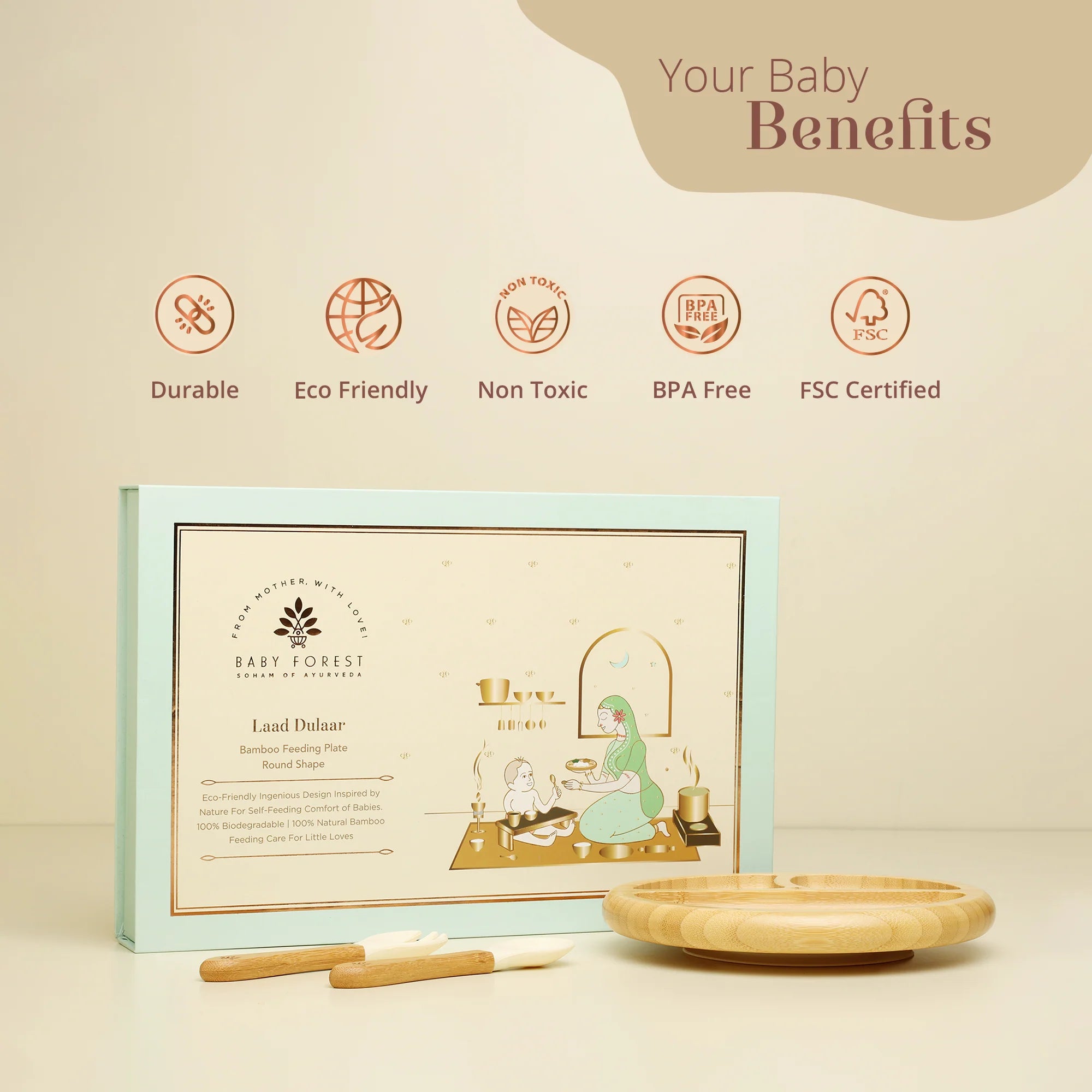Why Bamboo Utensils?
Bamboo baby utensils are great for everyday use and are made from 100% natural Bamboo. Scientific studies have shown that eating food in bamboo utensils leads to healthier digestion and increased absorption of nutrients. Bamboo contains antibacterial properties that reduce the risk of bacterial infections caused by food or touch. Our bamboo is sourced from FSC certified supplier. Hence, our bamboo plates are eco-friendly, bio biodegradable, and completely free from toxins and chemicals that won’t absorb bacteria or odors in your baby’s meal, unlike regular plastic and metals.
FAQs
What are the health benefits of eating on a bamboo plate for kids?
Bamboo plates are naturally free from harmful chemicals like BPA, phthalates, and PVC, which are often found in plastic. They’re gentle on sensitive baby skin, don’t leach toxins into food, and are naturally antibacterial. Bamboo doesn’t react with hot foods, making it safer for everyday use. Moreover, it supports healthy eating habits through its calming, non-distracting natural appearance and smooth texture.
How long do bamboo plates last?
With proper care, bamboo plates can last around 2 years. Their longevity depends on usage, cleaning habits, and environmental exposure. Regular oiling, avoiding the dishwasher or soaking, and keeping them dry help extend their life. While they may show wear over time, bamboo plates are durable and can withstand daily toddler use with ease if well-maintained.
How do you clean bamboo baby plates?
Wash bamboo plates gently by hand using mild soap and warm water. Avoid soaking, as excessive moisture can cause warping or cracks. Dry the plate immediately with a clean cloth. For extra care, rub with food-safe oil (like coconut or olive oil) once a week to keep the surface nourished and prevent drying. Do not use in the dishwasher or microwave, as this shortens lifespan.
Does bamboo have antibacterial properties that make it safer for babies?
Yes, bamboo naturally contains antimicrobial compounds like “bamboo kun,” which inhibit the growth of bacteria and fungi. This makes bamboo plates a hygienic choice for babies, reducing the risk of infections or food contamination. Unlike plastic, bamboo doesn't develop micro-scratches that harbor bacteria. This natural cleanliness, paired with regular washing, offers parents peace of mind when serving baby meals.
Are bamboo plates eco-friendly compared to plastic or silicone?
Bamboo is a renewable, biodegradable resource that grows quickly without the need for pesticides, making it far more eco-friendly than plastic or silicone. While silicone is durable and reusable, it's still a synthetic material and non-biodegradable. Bamboo, on the other hand, breaks down naturally after disposal. Choosing bamboo supports a sustainable lifestyle from the start.
Are kids bamboo plates available in different shapes and colors?
Yes, bamboo plates come in various shapes that make mealtime engaging and enjoyable. Baby Forest offers three fun and functional designs—car, owl, and round-shaped plates, each with three separate sections to serve different foods. This thoughtful design not only encourages balanced eating but also adds a playful touch to every meal, making it a fun, nourishing, and healthy experience for your little one.
Are bamboo plates safe in the microwave?
No, you shouldn’t use bamboo plates in the microwave. The strong heat can damage the plate, making it crack or lose its shape. It can also ruin the smooth finish and make it unsafe over time. Instead, heat the food in a microwave-safe bowl first, then put it on the bamboo plate once it’s warm and ready to serve.
How do I oil my bamboo plate and how often?
To maintain your bamboo plate, apply a thin layer of food-safe oil (like coconut or food-grade mineral oil) every 1–2 weeks. Make sure the plate is clean and completely dry before oiling. Use a soft cloth to rub the oil in, let it absorb for a few hours, and wipe off any excess. This prevents drying and cracking and helps keep the surface smooth and water-resistant.
Can bamboo plates help promote self-feeding in babies?
Yes, the design of bamboo plates, especially those with suction bases and divided sections, encourages babies to self-feed. The stability reduces spills, and the compartments make it easier for babies to identify different food items. This setup supports fine motor skill development, confidence, and independence at the table, which are key benefits of early feeding milestones.
Do suction base plates really prevent spills and messes?
Yes, the high-quality suction base on the Laad Dulaar plate ensures it stays firmly in place on tables and highchair trays. It helps prevent those dreaded mealtime messes—no more tipped-over plates or scattered bites. Your baby can stay focused on exploring their food while you enjoy a more peaceful, mess-free feeding experience.









